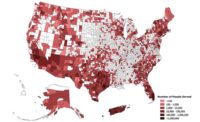Early in 2016, news of lead-tainted water in Flint, Mich., and the potential poisoning of thousands of children captured national headlines, as well as coverage in ENR.
As awareness grew about the potential for lead to leach into drinking water from corroded pipes, so did awareness of the possibility that a crisis such as in Flint could happen elsewhere, particularly in Rust Belt cities with shrinking populations and old pipes.
Several hearings were held on Capitol Hill, some of which were attended by Flint residents who rode overnight on buses to be present. Lawmakers were outraged at the scandal, although it was months before they would reach a deal on setting aside funds to help Flint.
Flint finally got the nod to receive funding to help rebuild its broken drinking-water infrastructure system in the continuing resolution bill that funds the government through April 2017, a bill which was signed in the final days of the congressional session. The bill includes $170 million in state revolving funds (SRFs) to cities—such as Flint—in which a public health emergency has been declared by the president.
By year’s end, Michigan Attorney General Bill Schuette (R) had brought three rounds of criminal charges against multiple individuals who allegedly played a role in causing the crisis. More criminal charges may be announced in the near future, Schuette and members of his investigative team said.
Largely as a result of the crisis in Flint, the U.S. Environmental Protection Agency in early December released an “action plan” that highlights the agency’s priorities to strengthen drinking-water enforcement and safety going forward.
The skirmish over the Dakota Access Pipeline seemed to intensify, rather than resolve itself over time. At its worst, workers with the Laborers International Union of North America (LIUNA) said they felt threatened coming to work due to protestors who chained themselves to construction equipment and created an intimidating environment. In December, the Obama administration said work on the Dakota Access Pipeline through the Standing Rock tribe’s lands would not resume during the remainder of Obama's term, effectively punting the decision on the project for the next administration.
In the final weeks of 2016, the EPA released a new study that backed away from initial claims in its June 2015-released draft that hydraulic fracturing does not cause “widespread and systemic” impacts on drinking-water resources. Instead, the final report suggests that, in some cases, fracking can cause contamination to groundwater.





